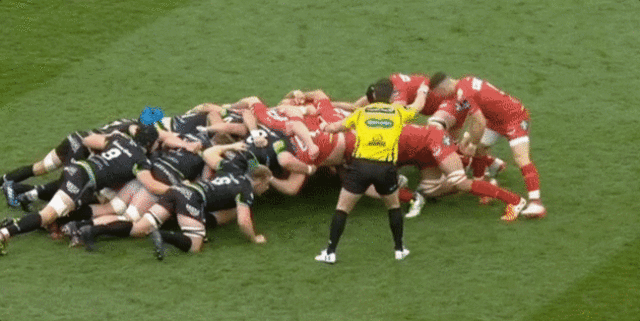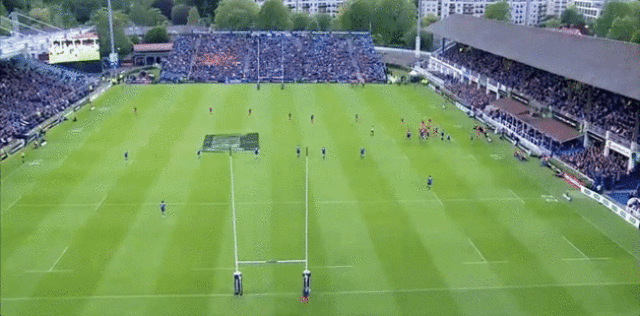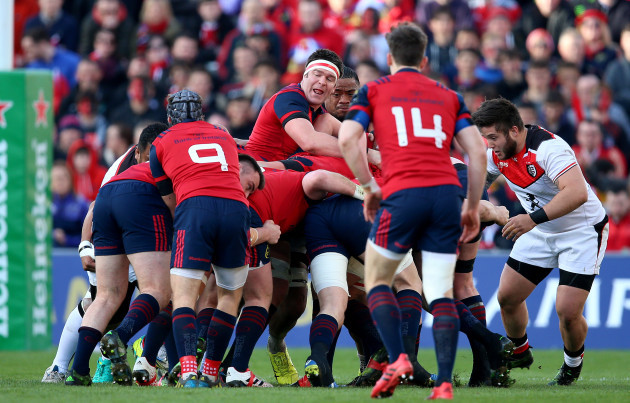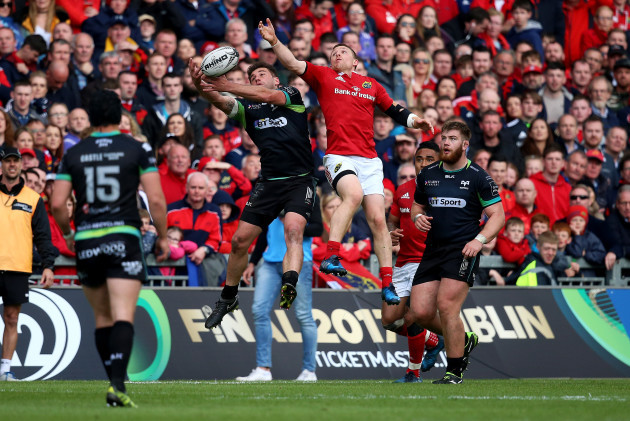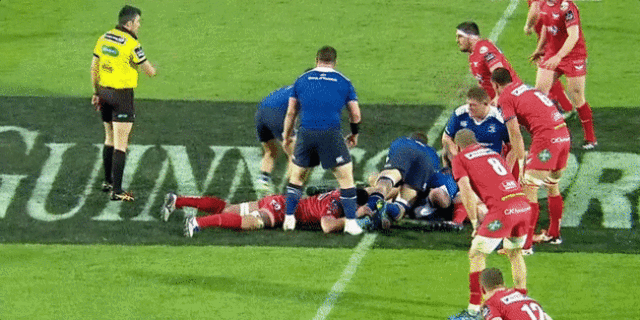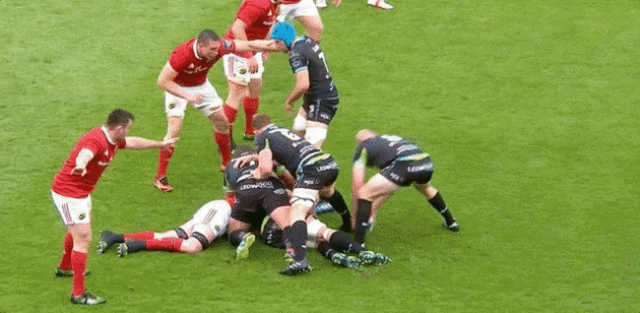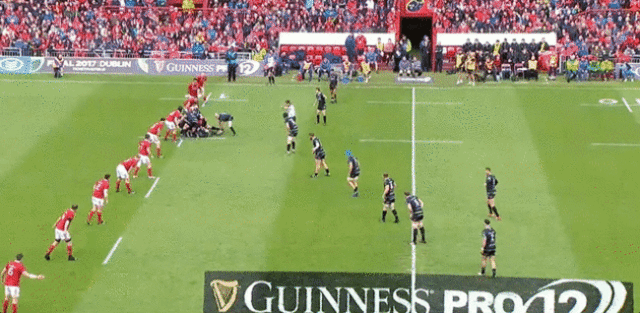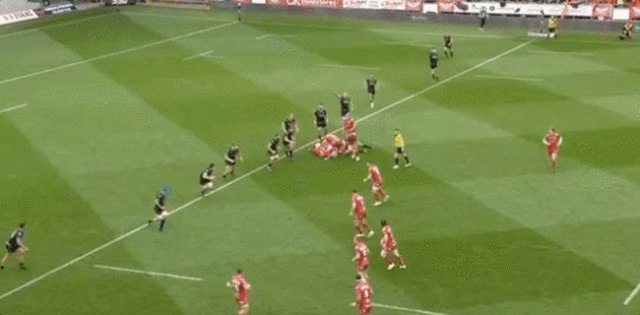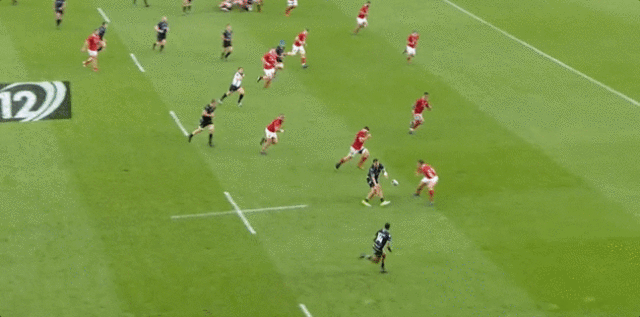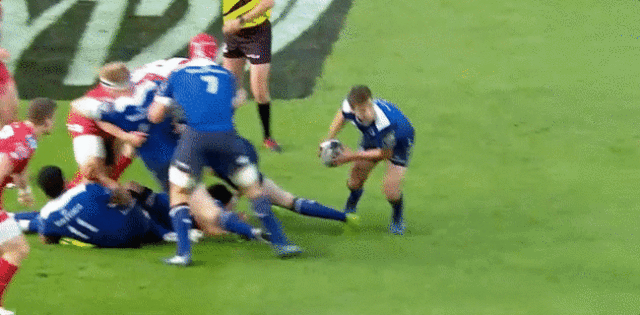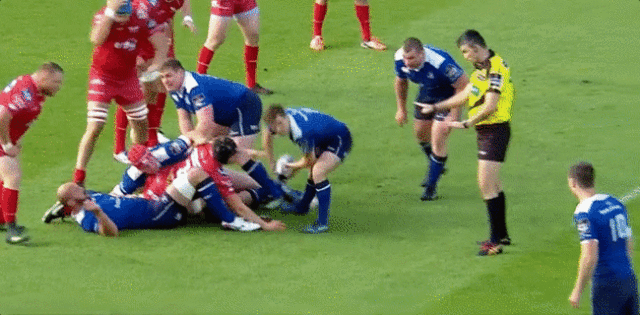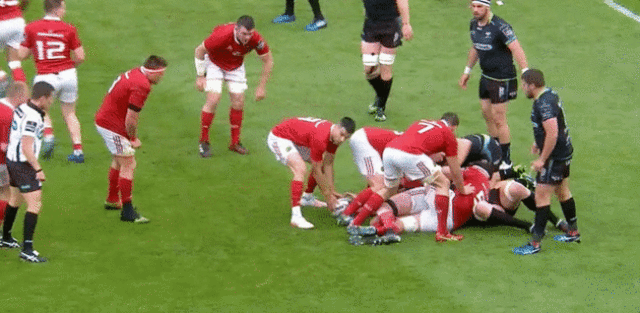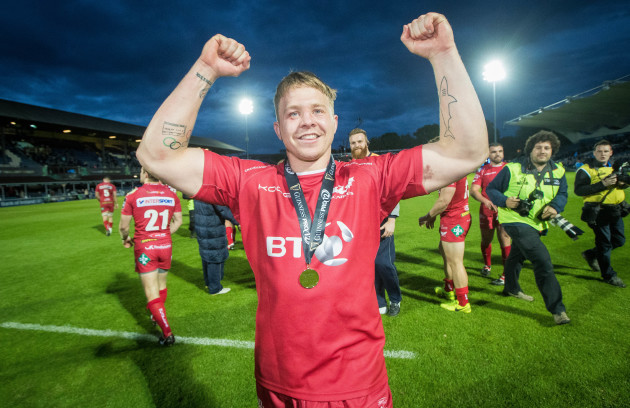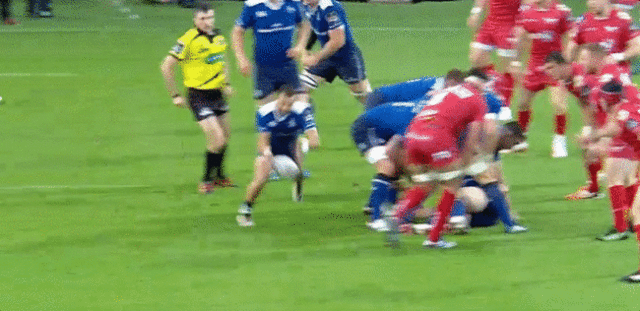Updated 5.35pm
WHAT WILL THE Guinness Pro12 final look like?
While it’s impossible to answer that question with 100% accuracy, Munster and Scarlets have shown us a range of distinctive strengths over the course of the season that allow us to make a fair prediction about the nature of today’s game [KO 6.15pm, TG4/Sky Sports].
Scarlets’ set-piece
Wayne Pivac’s side have been effective with their set-piece attack this season, with Stephen Jones’ intelligence as backs and attack coach shining through.
The Scarlets did major damage to Munster in this area during their 31-20 comeback win over Rassie Erasmus’ side in February at Thomond Park, particularly off scrum platforms, and have continued in that vein in recent months.
We get a fine example above in their recent 40-17 win over the Ospreys, with scrum-half Gareth Davies using the scrum platform to burst away for a linebreak, before feeding the in-form Jonathan Davies, who in turn hits the prolific Steff Evans to score.
This is a basic, simple example of what the Scarlets’ set-piece attack is all about – teeing up an excellent attacking player to expose a defender. In this case, Davies uses his pace to burn past the Ospreys’ Sam Underhill.
The Scarlets possess a backline filled with pace, from Davies to Evans to scintillating Kiwi fullback Johnny McNicholl. Their set-piece attack looks to utilise that pace.
In the instance above, the Scarlets target the ‘seam’ or ‘hinge’ area at the back of Leinster’s lineout, with Evans running a line off openside James Davies to burst through.
The point is that the Scarlets have displayed a wide variety of ideas and plans from set-piece, with wide attacks, clever chip kicks, kick passes, switch plays and so much more.
For Munster, this will be a key focus defensively and we can expect some fresh ideas from the Scarlets leading to huge pressure for the Irish province.
A prime target will be Kiwi outside centre Francis Saili, who has shown a habit of shooting up from the defensive line ahead of other defenders. Jones and Pivac are likely to have picked him out in building their set-piece playbook, even if Saili is capable of huge moments of defensive dynamism.
Munster’s maul
Munster will obviously look to attack intelligently from set-piece too, but their tactics from the lineout may be slightly different, with the likelihood being that they will drive a large proportion of their lineouts in the Scarlets half.
The southern province’s pack is a formidable unit and the work of Jerry Flannery has been important to their continuing success in the maul.
While brute force and aggression is often crucial in this area of the game, Munster’s pack are patient and intelligent at maul time too, often waiting for the crack to appear in the opposition’s defence.
When Munster sense that overload of attackers against defenders, they are often ruthless and they are likely to believe that they can get great gains with mauls today.
It would be no surprise to see Erasmus’ men score a try or earn penalties in this area.
Kick heavy
Munster kick the ball a lot. They have averaged 33.5 kicks in play in their six most recent games and it would be surprising if they did not pass the 30 mark again today against the Scarlets.
Of course, Erasmus’ men don’t just kick the ball away aimlessly.
They often kick to regain possession, and Conor Murray’s box kicks will be fiercely contested by Andrew Conway, Keith Earls and others today.
Along with those hanging contestables, which will also come from the boot of out-half Tyler Bleyendaal, Munster look set to attempt to keep the Scarlets pinned deep in their own territory.
Munster will be able to do what we, and Leinster, weren’t able to do,” is how Ospreys coach Steve Tandy puts it. ”I think Munster will find space in the backfield and they’ll squeeze Scarlets in.”
Expect this to be one of the key themes of the game, as Munster do their utmost to suffocate the Welsh side in their own 22, kicking into the space that is often left deep behind their defensive line.
Scarlets are excellent at targeting opposition ball at the breakdown, but this also requires them to fill the defensive line with bodies and can leave them exposed in the backfield. Even when they have 15 players on the field, they tend to give up deep space.
Leinster failed to exploit those tendencies last weekend in their semi-final defeat, but Munster will be certain to find that space if it shows again.
It’s worth pointing out that Scarlets are not afraid of using the boot either and kicked 29 times against Leinster in the semi-finals, though their average over their six most recent games is 23.5.
Pivac’s men tend to kick out of their own 22, looking to gain territory with the boot unless there is a blatantly advantageous counter-attacking opportunity.
With rain forecast for today, we should expect plenty of kicking in this Pro12 final.
Nienaber’s army
Much of Munster’s achievement this season has been built on their aggressive and tireless defence, with assistant coach Jacques Nienaber having impressively led this area of their game.
As a former Springboks defence coach, Nienaber came with a fine reputation and he hasn’t disappointed.
Munster appear to actively enjoy long periods of defence, where they have opportunities to repeatedly hammer opposition ball carriers. In last weekend’s semi-finals, the Ospreys played into their hands ideally by attacking narrowly.
Munster’s linespeed is so often led by their third defender out from the ruck, as we see with Dave Kilcoyne above and below.
These tackles actually come in the same passage of stifling Munster defence and the Ospreys attack does little to ask questions. The Welsh side were too happy to play into that strength of Munster’s, repeatedly losing yards in contact.
The Scarlets are likely to be a different proposition, however.
Their forwards often hang wide in the 15-metre channels during phase play and that means they are very often set up to attack in those zones, rather than limiting themselves to one-out carries.
The profile of their pack – mobile, quick, skillful – suits this approach and the likes of loosehead Rob Evans are very comfortable catching and passing.
It means they are unlikely to look to confront Munster with direct carrying and will instead attempt to continue their policy of asking the defence to cover lots of ground.
Intriguingly, Erasmus believes that the aforementioned Saili will be key in countering the athletic and pacy Scarlets attack.
“I would say it’s form and also for the specific opposition,” said Erasmus when asked why he opted for Saili ahead of Jaco Taute at outside centre.
“I think the amount of speed in the Scarlets backline from nine to 15, and also the reserves is exceptional. They have a really, really fast backline and I think we can benefit from Francis trying to fill the gaps there.”
Given the Scarlets’ pace on counter-attack too, Saili may have to make a few more try-saving tackles like the one he pulled off against the Ospreys’ Keelan Giles last weekend.
“Their record speaks for itself defensively,” said Scarlets boss Pivac. ”We found it very difficult against them in the first half in the game here earlier in the season.”
“We managed to score three tries in the second half so we take some heart from that. We are attacking very well and they are defending very well so it makes for a very interesting game.”
Direct Munster
Munster haven’t been very expansive in terms of their width in attack this season and it would be a major shock for that to change today.
Indeed, altering their attacking approach wouldn’t make sense for this contest, given the Scarlets’ relative weakness closer to the fringes of rucks.
Leinster repeatedly made big yardage tight to the ruck in the early exchanges of last weekend’s semi-final, but for inexplicable reasons they did not continue in that vein later in the game.
Their thinking was influenced by the red card for Evans, but the early minutes of the game had shown them exactly where to cut the Scarlets open. Even on their very first attacking passage, Leinster made huge inroads with a direct approach.
Munster will follow that blueprint, but it doesn’t necessarily mean only one-out runners.
Inside passes like the one above, pick and jams, and tip-on passes between forwards will all be important for Munster within their attacking phase play. They will also look for good footwork, well-timed acceleration and good latches on their one-out carries.
On top of that, the influence of Conor Murray will be important.
The Lions playmaker is intelligent around the fringes of rucks with passes like the one above, and we can expect more of this and Murray’s arcing runs today.
Scarlet poachers
The Scarlets are a major threat to every team at the breakdown, with James Davies often leading the way and the likes of Tadhg Beirne contributing handsomely.
Davies has 30 turnovers this season and Munster will have a target on his head for certain.
“We’ve played them twice now this season and in the second game, they certainly got the better of the breakdown,” said Erasmus. “I guess we’ve made some plans for that but it will still be a challenge, it’s not just one or two of them or the openside flanker.
“There’s a few guys in the team that really contest well at the breakdown.”
Below, it’s hooker Ryan Elias who makes the turnover, with Beirne assisting, and it’s a prime example of why Leinster’s tactics were so wrong in their semi-final defeat.
The Scarlets forwards are extremely mobile, as mentioned above, and Leinster’s wide approach in attack simply meant the Welsh pack could pounce at breakdowns where the ball carrier was more isolated.
Munster’s likely narrow approach should negate that somewhat, but they will still require huge accuracy and alertness in their attacking ruck work.
Expect the Scarlets to still have some success, but if Munster can maintain their possession, they will back themselves to build the kind of pressure that leads to defences cracking and giving up linebreaks or kickable penalties.
Something different?
Today’s finalists have varying strengths but they do look well-matched in terms of their overall quality.
Munster are the favourites after topping the regular-season Pro12 table but the Welsh side area carrying vital momentum and form into this tie, buoyed by being the first team ever to win away from home in the semi-finals.
They also beat Munster in Thomond Park as recently as February, which is another important mental factor.
That said, Munster appear to have the qualities required to limit the Scarlet’ impact and they are unlikely to be affected by the mental deficiencies that proved so costly for Leinster last weekend.
While the rain forecast for today is due to fall early in the day and clear by the 6.15pm kick-off, the resulting slippery conditions should suit Munster better.
Prediction: Munster win.
Munster:
15. Simon Zebo
14. Andrew Conway
13. Francis Saili
12. Rory Scannell
11. Keith Earls
10. Tyler Bleyendaal
9. Conor Murray
1. Dave Kilcoyne
2. Niall Scannell
3. John Ryan
4. Donnacha Ryan
5. Billy Holland
6. Peter O’Mahony (captain)
7. Tommy O’Donnell
8. CJ Stander
Replacements:
16. Rhys Marshall
17. Brian Scott
18. Stephen Archer
19. Jean Deysel
20. Jack O’Donoghue
21. Duncan Williams
22. Ian Keatley
23. Jaco Taute
Scarlets:
15. Johnny McNicholl
14. Liam Williams
13. Jonathan Davies
12. Scott Williams
11. Steff Evans
10. Rhys Patchell
9. Gareth Davies
1. Rob Evans
2. Ryan Elias
3. Samson Lee
4. Lewis Rawlins
5. Tadhg Beirne
6. Aaron Shingler
7. James Davies
8. John Barclay (captain)
Replacements:
16. Emyr Phillips
17. Wyn Jones
18. Werner Kruger
19. David Bulbring
20. Will Boyde
21. Jonathan Evans
22. Hadleigh Parkes
23. DTH Van Der Merwe
Referee: Nigel Owens [WRU].
- This article was updated at 2.22pm to correct ‘treat’ to ‘threat’ in the first paragraph of the ‘Scarlets poachers’ section.
The42 is on Instagram! Tap the button below on your phone to follow us!
